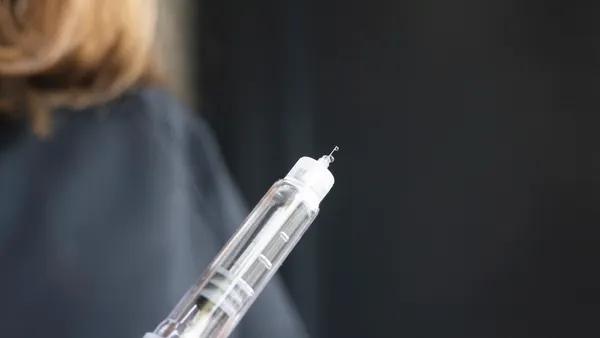Patient recruitment remains one of the biggest challenges in drug development for all therapeutic categories. According to widely cited data, as many as 85% of clinical trials fail to recruit enough patients and 80% face delays due to recruitment problems.
Those challenges are even greater when it comes to rare diseases given the small patient populations, most rare diseases affect children, and the fact that many physicians are encountering certain conditions for the first time. Yet, most trial participation is a result of physician referral, according to a 2021 survey conducted by Informa Pharma and Rare Patient Voice.
Wes Michael, president and founder of Rare Patient Voice, launched the company with a mission of empowering patients and caregivers to share their voices with researchers and companies developing life-changing products. True to its vision, the company has multiple ways for patients to share their voices — through surveys, online communities and interviews — to improve the process of developing medical products and services.
“The key source of information about a clinical trial is the physician, and often patients think if a trial was appropriate for them, their physician would have mentioned it,” Michael says. “We've found rare disease patients want their voices heard, so the challenge is not with patients wanting to participate as much as in finding the ‘needle in the haystack.' A lot of advocacy groups are now helping with this.”
Rare Patient Voice seeks to engage patients by attending advocacy events, meeting patients and their families and explaining the research process.
“We augment this with online outreach and working with many referral partners, both advocacy groups and individuals,” Michael says.
Here, Michael shares his view on the importance of the patient voice in clinical trial recruitment.
PharmaVoice: What are the biggest challenges with recruiting rare disease patients for clinical trials, both from the patient and sponsor perspective?
Wes Michael: Surveys we have done found that the biggest obstacle is finding relevant trials both from a geographic and condition perspective. There also can be some mistrust of the industry based on historical experience, and diagnosis is certainly a major factor.
We did a study a couple years ago about the long and winding road to get to a diagnosis, especially with rare diseases. And one of the things that came out was that feeling among many people that there was a bias, that they weren't being heard, particularly women and minorities. Patients who were diagnosed after many years felt that if only the physician had listened to them they could have gotten help sooner.
Pharmaceutical companies can often help because once they come out with a treatment for something, especially if it's a new area that hasn't had treatment, they start educating the physicians or the appropriate specialist. And once they do that, physicians start looking at symptoms in relation to those conditions.
Why is the patient voice so important in the development and recruitment process?
Without hearing from patients, researchers can make wrong decisions. I remember being at a pulmonary fibrosis conference with patients, physicians and researchers. The researchers were developing treatments to save patients' lives. The patients were grateful, but they said the cough was making their quality of life suffer. The researchers said the cough wasn't what was killing them, but the patients pushed back and said they didn't want to live with that cough. Ultimately, the researchers heard the voice of the patient and learned how important that facet of their quality of life was to them.
Another example is treatment for erythropoietic protoporphyria (EPP), a condition that causes patients severe pain on exposure to sunlight and some artificial light. One patient, who is also a researcher, noted that a treatment under investigation lengthened the time before the burning sensation began to happen. While regulators were saying this time duration wasn’t enough to help anybody, the feedback from patients led regulators to look at the data again and the product was approved.
The industry is learning to listen more and regulatory bodies are also asking for the patient perspective. It’s no longer enough just to consider expert opinion; increasingly it’s become important to engage patients and advocacy groups.
What feedback have you had from patients on what matters most to them in the recruitment process?
Communication is key: saying in plain language what the study is, what is required of them and whether they will be compensated. So many patients want to have their voices heard; they tell us about their experiences, even if it doesn't benefit them personally, so that it helps those coming after them.
The 2021 survey we did found that 80% viewed the recruitment process positively and would recommend and repeat the process. However, most didn’t get results from the study they participated in and the need for feedback is the No. 1 suggested change to the trial experience.
Can you share some experiences of rare disease patients in the clinical trial process?
Some patients' families have had to move to be closer to care, including being closer to a clinical trial site. Some caregivers — often moms — have given up careers to take care of their loved ones. The joy in the cases where a clinical trial has saved a life is overwhelming. One young woman had a rare cancer and was treated at a top university hospital. But she wasn't offered much hope. Her sister searched and searched and found some potential clinical trials. She qualified for one and it saved her life. She wouldn't be alive if it weren't for her sister's persistence.
What are some of the big changes you’re seeing in patient recruitment and clinical trial processes in recent years?
The biggest change is the shift, where possible, toward decentralized clinical trials. This was so important during COVID as it wasn't safe for patients to go to the clinical sites. But the need was there even before COVID. The hassle, time and expense of frequent traveling to distant clinical sites can be a great burden to patients and their families. Making some or most of the trial participation feasible from the patient's home overcomes that burden.
We often overlook the fact that patients with rare diseases are not necessarily that mobile. On top of that, they have to be able to live their lives, so the more that we can do to remove those barriers to participation the better.
There’s a growing trend to give ratings to experiences, such as hotels and restaurants. Why not do the same with healthcare, including clinical trials? That would encourage clinicians, researchers and others to think about care from a customer perspective. How can we bring down those barriers and make care a five-star experience for patients?









